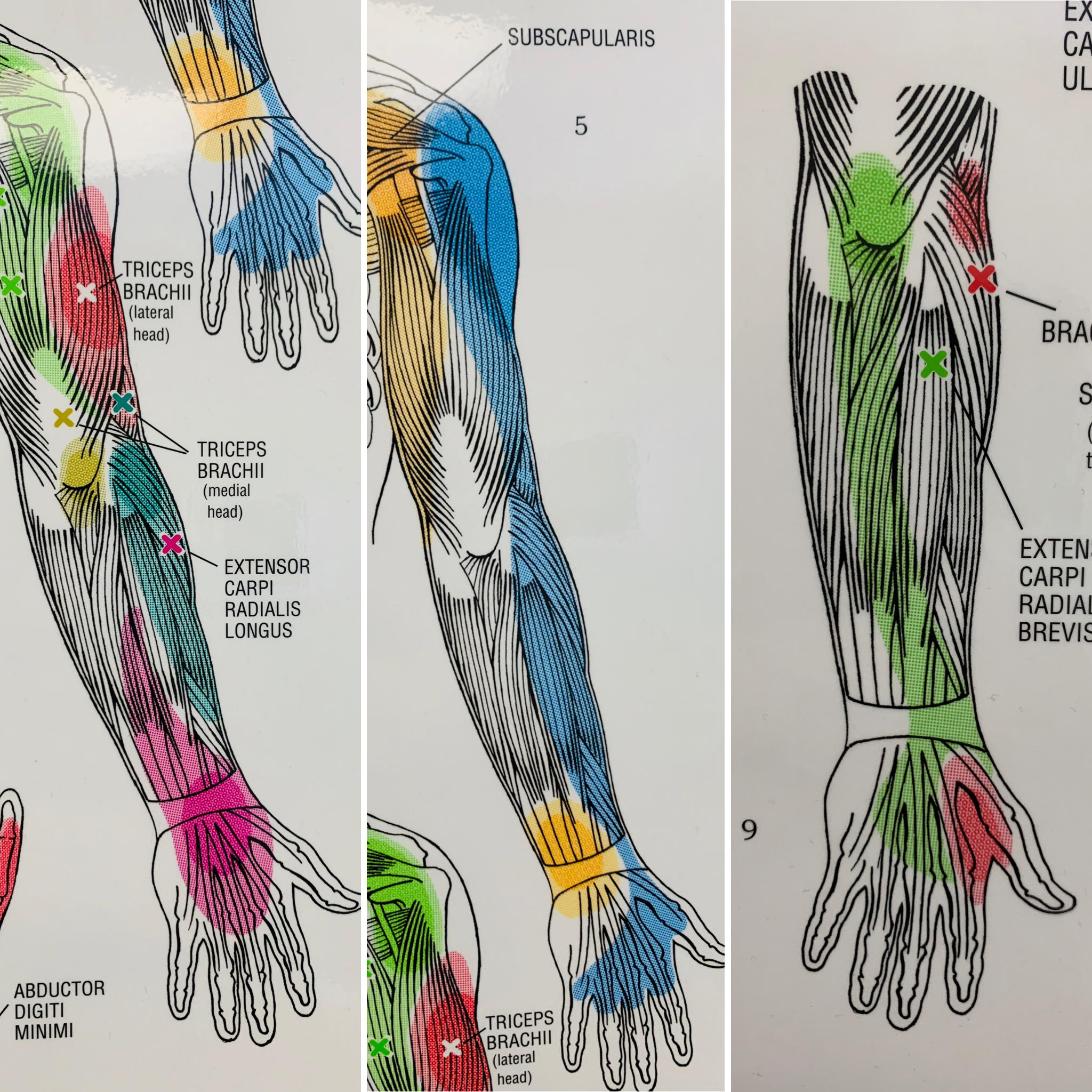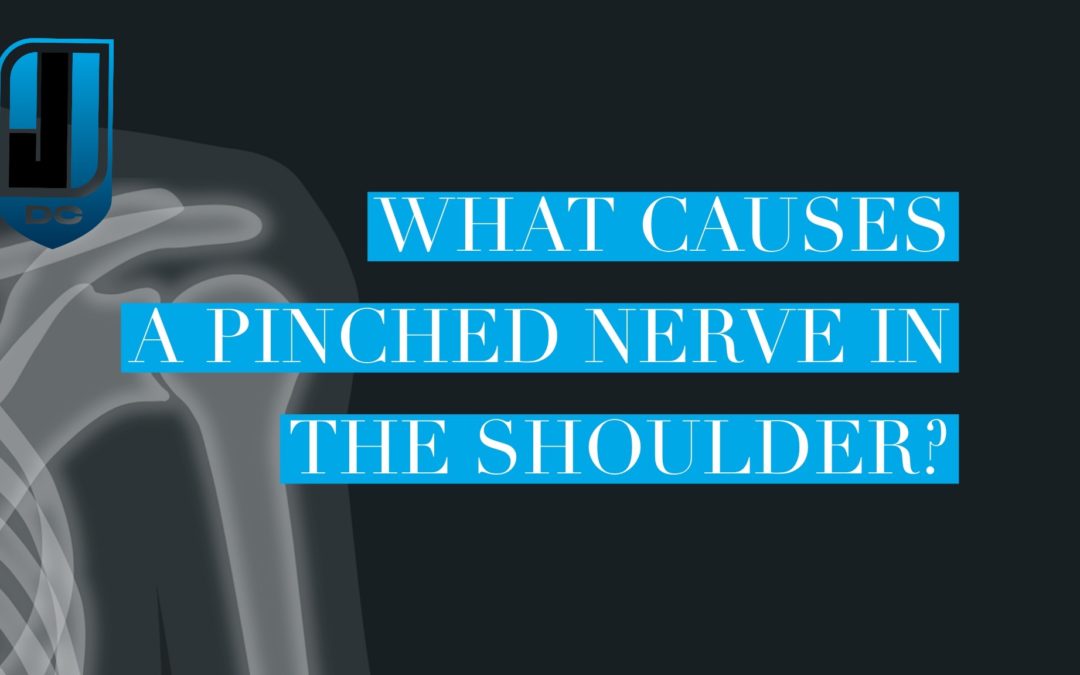If you’re suffering with nerve pain in the shoulder and arm you’re likely trying to find out “What causes a pinched nerve in the shoulder?” Unfortunately there are a variety of conditions that cause a pinched nerve in the shoulder. Some causes are very serious, while other are less so and a bit more simple. What’s for certain is that pain from a pinched nerve in the shoulder can be frustrating to manage. In this content I’m going to explain some of the common causes of pinched nerves in the shoulder.
First, let me clear up what a pinched nerve in the shoulder or pinched nerve in the neck actually means. “Pinched nerve” is a term usually used by doctors and patients to describe what’s called a cervical spinal nerve root irritation and compression. It’s technically called radiculopathy, but pinched nerve is a more common term. Although common, it doesn’t accurately describe what’s causing your pain.
Nerves typically don’t become pinched like you imagine. Almost never are they becoming “kinked like a garden hose.” If this was the case, your symptoms would be worse than pain and would involve severe or total loss of strength and movement. Instead they become irritated and inflamed due to chemical and mechanical reasons. I’ll explain this a little more later.
Make sure you read my subsequent articles about a pinched nerve in your shoulder where I answer all your questions on the topic. You can read them by clicking on the links below!
- What doctors treat a pinched nerve in the shoulder or neck?
- What’s the best doctor for a pinched nerve in the shoulder or neck?
- Chiropractic for a pinched nerve in the shoulder
- When should I see a doctor for a pinched nerve in my shoulder?
3 Things That Often Cause Pinched Nerves in Neck and Shoulder
There are 3 things that often cause pinched nerves in the neck and shoulder:
- Cervical Intervertebral Disc Injuries – Cervical disc injuries, like cervical disc herniation, cause an inflammatory irritation and compression of the nerve root. The combination of inflammation at the site of the nerve root plus the disc pressing on the nerve root creates pinched nerve symptoms.
- Cervical Spine Degeneration (Cervical Spondylosis) – Cervical spine degeneration is the process where the spine begins to change in an unfavorable way. It’s important to know that to some extent this happens in everyone as you age. It can cause pinched nerve symptoms because it narrows the holes where spinal nerve exits, this is called foraminal encroachment.
- Cervical Spine Stenosis – Cervical spine stenosis is when the central canal, where the spinal cord is housed, or the holes where the nerve roots exit narrow. The narrowing causes the nerve root to be encroached upon by a bony spur that irritates or compresses the nerve. Stenosis is a component of cervical spine degeneration as explained above.
All three of these conditions are closely related and sometimes you may have more than one of them causing pinched nerve symptoms in the shoulder. It’s important to know that these conditions usually develop over time for most people.
Pain Patterns From Trigger Points in the Arm
Many of these pain patterns are similar to pain caused by a pinched nerve in the shoulder. Dry needling is a treatment that can be effective for treating both referred pain and pain from a pinched nerve in the shoulder.

What Are Other Causes of a Pinched Nerve in the Shoulder?
There are various other causes of a pinched nerve in the shoulder besides neck conditions. Although degenerative changes and cervical disc derangements are the most common causes, problems in the shoulder or arm are also common culprits of pinched nerve symptoms. Again, this is why I can’t stress enough that you should get examined and not guess what’s causing your symptoms.
Here are some of the other common causes of pinched nerves in the shoulder:
- Thoracic outlet syndrome – This conditions is caused by compression of a bundle of nerves called the brachial plexus. The brachial plexus can be compressed by the pectoralis minor muscle of the scalene muscles, for example. When it’s compressed it causes pain that shoots from the shoulder and/or neck region down the arm.
- Nerve traction injury – A nerve traction injury is where a nerve is forcefully pulled, something that happens in motor vehicle accidents. This causes neuritis and neuralgia which then cause nerve pain to travel into the shoulder and down the arm.
- Cervical rib – Some people may have an extra rib that connects to the lowest vertebra in the neck. While this is a normal variant, it can cause the brachial plexus bundle of nerves to become irritated. Irritation of the bundle of nerves can result in pinched nerve symptoms.
- Referred pain from the rotator cuff – Referred pain from the rotator cuff can cause pain that is similar to a pinched nerve. Rotator cuff injuries wont cause pinched nerves in and of themselves, however. Trigger points in the shoulder, impingement syndrome, and rotator cuff tears are common problems that produce pain that travels down the arm.
These are just a few other diagnosis’ that I would consider when I’m examining your pinched nerve symptoms. There are certainly other injuries or conditions that can cause the discomfort besides these. The good news is that during an exam I can typically find the top 1-2 reasons that you’re getting shooting arm pain.
Think You Have a Pinched Nerve in Your Shoulder?
These exercises are often helpful for “freeing up” a pinched nerve in the shoulder. Check out the video and see one of the most powerful treatments for a pinched nerve in the shoulder! Have other questions or video suggestions? Leave a comment and I’ll do my best to answer!
What Does a Pinched Nerve in the Shoulder Feel Like?
A pinched nerve in the shoulder or neck typically creates a sharp and shooting pain into the shoulder, arm, chest and/or upper back. You may also feel it as a tingling and numbness sensation traveling down the arm.
At the beginning, symptoms often start in your neck near the spine. As symptoms progress they’ll start to travel further away from your spine and often into the shoulder and arm. You may be able to trace the path of symptoms as they emanate away from the spine in many cases.
When symptoms travel away from the spine, it’s called peripheralizing. Peripheralizing means that symptoms are spreading further from the site of your injury. For example, you may have neck pain that shoots down the side of your arm when you turn your head. Sometimes peripheral symptoms are constant and don’t come and go based on movement, this is undesirable.
In your case there may be certain positions of your head, neck, arm, or spine that cause pinched nerve symptoms to retreat towards the spine. When pinched nerve symptoms retreat back towards the origin of the problem (usually the spine) we call this centralizing. For example, you have neck pain that travels down the side of your arm. When you look upwards the pain in you arm stops and you only feel neck pain, this is a desirable finding.
How Do I Know If I Have a Pinched Nerve in My Shoulder or Neck?
To know if you have a pinched nerve in your neck or a pinched nerve in your shoulder you should see a medical provider. As a chiropractor, I evaluate and treat pinched nerves symptoms frequently. This is especially true at my office in Sentara Therapy Center in Dumfries, VA. I work for a medical group so primary care physicians often send their patients to my Dumfries, VA chiropractic office for evaluation and treatment.
How I Examine a Pinched Nerve in the Shoulder or Neck
- Get a thorough description of your pain directly from you, called a history of present illness. I’ll get a general idea of your general health, the timeline of your symptoms, and what may have caused your symptoms.
- Perform a neurological exam where I test your reflexes, do manual muscle testing, and evaluate your sensory dermatomes. This is important because pinched nerves can cause diminished deep tendon reflexes, cause muscle weakness, and result in a loss of sensation. Chiropractors spend a large portion of their day examining and treating conditions related to nerves.
- Check range of motion in the neck, back, and shoulder. This helps me identify what movements you do that are difficult and painful. Dysfunctional movements may be causing pain down your arm.
- Orthopedic testing allows me to narrow down exactly what makes your pinched nerve symptoms feel better and worse. These tests help me narrow down where it’s coming from.
- X-rays or MRI are typically not tests that I order for you right away. There are exceptions, however. If you have more complex neurological findings, a history of trauma, or I’m concerned about pathology then they are appropriate to order. X-rays or MRI can sometimes affect recovery in negative ways when not ordered appropriately, so I’m judicious about ordering them.
If you think you have a pinched nerve in your shoulder or a pinched nerve in your neck then I’d strongly recommend you see a rehab-focused chiropractor. Chiropractors should be able to diagnose your condition correctly and develop a treatment plan to recover from it.

Jason Williams DC is a licensed Doctor of Chiropractic with Physical Therapy Modality and Acupuncture privileges. He is a chiropractor in Dumfries, VA at Sentara Therapy Center. Dr. Williams’ clinical expertise is in the evaluation, treatment, and rehabilitation of neuro-musculoskeletal conditions. Specific focuses include spinal, extremity, and sports-related complaints. He brings a patient-first attitude to his treatments and is a proponent of evidence-based and integrative care. See more content and his contact info here.
The opinions and views are mine personally, and do not necessarily reflect the views of others in the profession, my employer, or organizations that I belong to.



